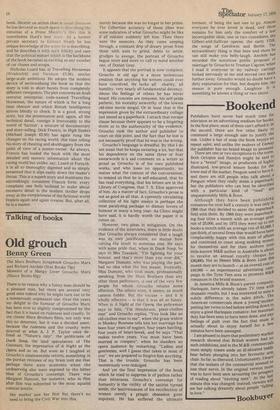Talking of books
Old grouch
Benny Green
The Marx Brothers Scrapbook Groucho Marx and Richard Anobile (Star Books 75p) Memoirs of a Mangy Lover Groucho Marx (Manor Books 65p) There is no reason why a funny man should be a pleasant man, but there are several very good ones indeed why he might turn out to be a monstrously unpleasant one. Over the years my delight in the humour of Groucho Marx has been ever so slightly compromised by the fact that it is based on rudeness and cruelty. In the classic Marx Brothers films, not Only was this no deterrent, but it was a decided asset, because the rudeness and the cruelty were directed at what A. J. P. Taylor once defined as "Nature's rats", the politicians of Duck Soup, the land speculators of The Coconuts, the impresarios of A Night at the Opera and so on. But even as I laughed at Groucho's unanswerable retorts, something in the puritan recesses of my brain told me that perhaps there were moments when the undeserving also were exposed to the bitter blast of Groucho's contempt. There was Margaret Dumont, for instance, who in film after film was subjected to the most squalid comical insults: Her mother saw her first but there's no need to bring the Civil War into this. merely because she was no longer in her prime. The Gilbertian accuracy of these jibes was.
some indication of what Groucho might be like if all restaint suddenly left him. Then there were the memoirs. As they came seeping through, a constant drip of dreary prose from those with axes to grind, debts to settle. grudges to avenge, the portrait of Groucho began more and more to call to mind another one, of Dorian Gray.
It appears that the portrait is now complete. Groucho in old age is a more monstrous creation than anything his writers could ever have conceived. He lacks all charity, all humility, very nearly all fundamental decency. About the feelings of others he has never heard. His conceits are tiresome, his self-pride pathetic, his morality unworthy of the lowest old-time movie mogul. Or at least that is the impression given by the extraordinary collage just issued as a paperback. I attach that escape clause because there appears to be a lingering doubt as to the authenticity of the evidence. Groucho took the author and publisher to court on this point, and the fact that he lost is not necessarily proof that he was in the wrong.
Groucho's language is dreadful. By this I do not mean that he keeps swearing a lot, but that his dependence on the same three or four swearwords is a sad comment on a writer as proud as Groucho is of his own published works, and who loses no opportunity, no matter what the context of the conversation, to remind us that he is self-educated, that he has read everything, that his letters are in the Library of Congress, that T. S. Eliot approved of him. As a matter of fact, Groucho's prose is not as good as all that. A currently circulating collection of his light essays is perhaps the most paralysing package to dismay lovers of humour in many a long year. As Chico might have said, it is hardly worth the paper it is rotten on.
However, two pleas in mitigation. On the evidence of the interviews, there is little doubt that Groucho always considered that a laugh was its own justification, no matter how cutting the insult to someone else. He says with some pride that, when in Duck Soup, he says to Mrs Teasdale, "I'm fighting for your honour, and that's more than you ever did," Margaret Dumont, who was playing the part, had no idea what the line meant. Ironically, Miss Dumont, who took more, professionally speaking, from the Marx Brothers than any other three performers, is one of the very few people for whom Grouch() retains some affection. The others were, it seems, so much cannon fodder. But the excuse — and it is wholly effective — is that it was all so funny. When in A Night at the Opera, the policeman says to him, "I'm Henderson, plain-clothes man" and Groucho replies, "You look like an old-clothes man to me", when the grass widow in Monkey Business tells him her marriage has been four years of neglect, four years battling, four years of heart-break, and he says "That makes twelve years. You must have been married in rompers", when he . slanders an opera audience by remarking, "Ladies and gentlemen, well I guess that takes in most of you", we are prepared to forgive him anything. That is the trouble. Groucho has been monstrously over-indulged.
And 'yet the -final impression of the book which he tried to suppress is of pathos rather than bitterness. Groucho's contempt for humanity is the virility of the satirist turned senile, the lasciviousness of his recollection of women merely a priapic obsession gone impotent. He has suffered the ultimate
torment, of being the last one to go. Almost everyone he ever loved is dead, and there remains for him only the comfort of a few incorruptible idols, one or two comedians, the Gilbert-and-Sullivan operas, the early FDR, the songs of Gershwin and Berlin. The extraordinary thing is that here and there he can still make you belly-laugh. Anobile has recorded the notorious public proposal of marriage by Groucho to Truman Capote; when I read it everyone in my railway carriage looked nervously at me and moved two seats further away. Groucho would no doubt have a dirty explanation for that, but despite him, the reason is pure enough. Laughter. It is something he knows a thing or two about.


























 Previous page
Previous page